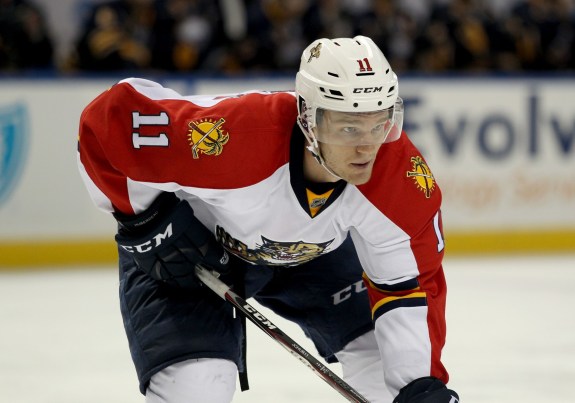A Season for the Ages
When the Florida Panthers drafted Barrie Colts defenseman Aaron Ekblad first overall in the 2014 NHL Entry Draft, they had a pretty good idea of what they were getting. Ekblad was billed from the start as one of the few “NHL-ready” players in that draft class, and he certainly didn’t disappoint.
Ekblad’s rookie year saw him put up 12 goals and 27 assists. His 39 points were fourth-highest on the team, and only two points shy of Bobby Orr’s NHL record for points by an 18-year-old defenseman. His four game-winning goals tied for the team lead with Brad Boyes and Brandon Pirri. Panthers fans weren’t the only ones to notice his skills — Ekblad won the 2015 Calder Trophy for the NHL’s best rookie, narrowly edging out Mark Stone of the Ottawa Senators and Johnny Gaudreau of the Calgary Flames.
What Makes a Sophomore Slump?
After such a dramatic entrance into the league, what can Ekblad do for an encore? After all, the “sophomore slump” is somewhat legendary. A huge amount of promising rookies have failed to carry over their success into the following year. But at the same time, it’s far from a given that a Calder Trophy winner will regress in their second season.
When you look at players who have seen their production drop during their second season, some recurring themes begin to emerge. Sometimes, injuries limit the player and sap his productivity (see: Jonathan Huberdeau). While much of this is outside of the player’s and the team’s control, the jump to playing an 82 game season at a much higher level can lead to serious problems if the rookie’s health is not monitored continuously. Teams also need to be willing to sit young players before their injuries get too serious.

Other times, the new player’s support system is pulled out from under him. An example of this was 2010 Calder Trophy winner Tyler Myers. His sophomore numbers dropped, but that could have been due to the loss of his defense partner Henrik Tallinder. Tallinder, a calming and steadying veteran influence, helped Myers get acclimated to the NHL. Again, it’s the team’s responsibility to ensure that their young players (who are still in need of the voice of experience) have the right veteran teammates to help avoid the landmines that NHL hockey can throw at them.
Another possibility is that a new player may lack the discipline to continue to grow his game after “making the show.” NHL veterans know that they need to be constantly learning if they want to have continued success. Some have had to learn this lesson the hard way. No matter how talented a player is, if he has a one-dimensional game, the rest of the league will find out his weaknesses and begin shutting him down. It’s a necessary offshoot of playing against the best in the world. In the end, it’s up to the player to realize their shortcomings and add to their game if they want to keep an NHL job. The team can keep a strong veteran presence for support and leadership, but that can only go so far.
What Does This Mean for Ekblad?
It seems like the Panthers are doing everything they can to keep Ekblad on track and away from a sophomore slump. There is little doubt that Ekblad has a strong mentor on the team in captain Willie Mitchell. Grantland’s Katie Baker chronicled the story of how Mitchell and his wife opened their home to Ekblad during his rookie year. A common theme among many athletes undergoing a sophomore slump is a lack of support and/or veteran mentors. That won’t be an issue for Florida’s 19-year-old blueliner.
My favorite people ❤️ love you to #Family https://t.co/lISKlm46Z1
— Aaron Ekblad (@Ekblad5FLA) June 25, 2015
Ekblad credits a strong support system that includes three generations of defencemen: his agent, Bobby Orr; Panthers colour analyst Denis Potvin; and Florida captain Willie Mitchell, with whom he lives.
“I’ve been very lucky,” Ekblad said. “It’s made it a little bit easier for me to step in and just play and enjoy it.” – Stephen Whyno (The Globe and Mail)
Ekblad has the support he needs — the rest is up to him. From all indications, he is one of those players who “gets it.” He knows nothing is given and that he has to keep growing in order to succeed. The scary part (for other teams) is that he’s still only 19, and still evolving his game. There will be bumps along the way, and plateaus to overcome. But if anyone can destroy the myth of the sophomore slump, it’s Aaron Ekblad.